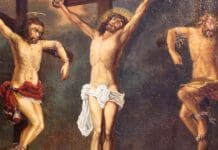Today Fr. Rumble begins to draw out in his essay some of the devastating consequences of faith alone in the individual, in worship, and in the standards of Christian conduct.
Ave Maria!
Love uCATHOLIC?
Get our inspiring content delivered to your inbox every morning - FREE!


















My major disagreement with the essay, speaking as a Lutheran, is the seeming belief that Sacraments are unimportant to Protestants and not a means of Grace. Regarding Baptism and the Lord’s Supper, that belief is just wrong.
Jim,
I don’t think that you view the sacraments in the same way as Catholics. Take for instance what you call “The Lord’s Supper” and we Catholics call “The Eucharist”. When we see the Host raised above the alter by the priest, we do not see simply unleavened bread, we see Christ in his entirety–body, blood, soul and divinity. It is not simply a symbol of Christ and the supper he hosted, but is actually Christ, present in that Host. Protestants (I’m a convert, by the way) simply look at this as a representation of what transpired on Christ’s last evening on earth. There is no belief that Christ is present in the Eucharist–in fact, most of the time the bread that is used by most protestant ministers is simply cut from a loaf of bread from the local market and not unleavened bread as was used by Christ.
Baptism is another source of difference between Protestants and Catholics.
“Baptism is the door to the Holy Spirit and to the other sacraments (Council of Florence). By Baptism, the believer is freed from sin, reborn as God’s child, made a member of Christ and of the Church, and given a share in the Church’s mission”. (Catechism 1213)
Probably not much difference in what you believe. Where many Protestant sects tend to move away from us is on the issue of infant baptism. Once again, the Catechism tells us:
“Children need the new birth of Baptism to be freed from darkness and brought into God’s family. Because infant Baptism shows God’s total gratuitousness, the Church (and parents) would deny the children a priceless gift if they were not baptized shortly after birth. Infant Baptism has certainly been practiced since the second century and quite possibly from the very beginning of the Church since Scripture speaks of “households” being baptized” (See Acts 16:15, 33; 18:8; 1 Cor 1:16). (Catechism 1250-1252)
This isn’t to say that infants have sinned, but they have been born of original sin and therefore require that cleansing that is brought forth through baptism. Of course, another argument that is brought forth is the issue of infant death prior to baptism. The argument goes something like–certainly God doesn’t view infants as having sinned and therefore they are assured entry into Heaven. Catholics believe that “…the mercy of God (who wills all to be saved) and Jesus’ tenderness toward the children, allow the Church to hope that these children are saved. The Church calls parents not to prevent their children from receiving Baptism. (Cathechism 1259-1261).
There are many other issues that are brought about through the Protestant belief in “faith alone” (Sola Scriptura) but those are for another day…
Hi Jim, you said, “speaking as a Lutheran” Luther created a brand new protestant bible by throwing out 7 books of the bible he personally didn’t agree with, and added the word “alone” after the word “faith”, in Romans 3:28, in order to make the verse agree with his view of what it should have said (faith alone). This alteration of sacred scripture directly contradicts James 2:24. Luther also called the Catholic Church “the whore of Babylon”, and he said that the Pope was the antichrist (someone who denies that Jesus is God). Why do you follow Luther?
As a former protestant that was called ‘home’ to Rome sweet Rome, out of confusion, I say well said. And I pray Jim comes to the truth. Amen.
I find it difficult to understand why Protestant Christians adhere to “Faith alone,” when this is refuted by the Bible itself! As St. James states in his epistle, “Faith by itself, if it is not accompanied by action, is dead.” A “belief” in God is not enough, as “even the demons believe that -and shudder.” We must not only believe in God, but try our best to accept/obey His commandments, which includes loving one another -not just in word, but in action. Faith must be accompanied by a conscious effort to do good works. The two are inseparable. As James says, “Show me your faith without deeds, and I will show you my faith by what I do.”
Good works are emphasized throughout the New Testament:
* “What good is it, my brothers, if a man claims to have faith, but has no deeds? Can such faith save him? Suppose a brother or sister is without clothes and daily food. If one of you says to him, ‘Go, I wish you well; keep warm and well fed,’ but does nothing about his physical needs, what good is it?” (James 2:14-16)
* Referring to Abraham’s offering of Isaac, James notes that “His faith and his actions were working together, and his faith WAS MADE COMPLETE by what he did.”
* Christ also implies that our works on earth have implications in the afterlife. “For the Son of Man is going to come in his Father’s glory with his angels, and then he will reward each person according to what he has done.” (Matthew 16:27)
* In Mark 10:21, Christ says “Go, sell everything you have and give to the poor, and you will have treasure in heaven.” If faith alone was enough, why not say, “Go and have faith, and you will have treasure in heaven”?
* Christ warns us we could be shut out if we fail to act on our faith: “Depart from me, you who are cursed… I tell you the truth, whatever you did NOT do for one of the least of these brothers of mine, you did NOT do for me.” (Matthew 25:40-45)
* In the parable of the talents, was the master not pleased with those who actually did something with their talents (vs. the one who simply buried it)?
* In 1 Corinthians 3:13-14, Paul states, “…the fire will test the quality of each man’s work. If what he has built survives, he will receive his reward.”
Works alone will not justify us. But if we are truly faithful, our good works must show. As Christ said: “By their fruit you will recognize them… Every good tree bears good fruit…” (Matthew 7:16-17)
Paul does say that “by grace are you saved, through faith, not of works.” Is he contradicting James? Paul is not referring to good works done out of faith/love, but to Mosaic law works, i.e. the ritualistic sacrifices and “good works” that Jews were commanded to do under Mosaic law. Many would do these out of ritual, not out of love, and act as if that were enough to “buy” their way into Heaven. It’s similar to the erroneous notion some have that if they go to church every weekend they’ve done enough. God “owes” them salvation. But God has no contractual obligation with us. Salvation is a gift, but one to which we are called to correspond to equally as such in return. If we are faithful to God, and do good works out of love, as a gift to God, he will be pleased with us, and reward us. So there is no contradiction between Paul and James. Paul says ritualistic works will not save you, as only your faith can, while James says if you truly have faith, it must show through good works (done out of love, not obligation/expectancy of payment).
For those interested in finding out more about the Scriptural basis of Catholic beliefs (as well as excellent quotes from our Church Fathers -those earliest of Christians) I suggest this lay website: http://www.scriputrecatholic.com
Ephesian chapter TWO.
hi pat, what about eph 2?